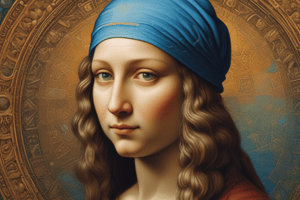Podcast
Questions and Answers
Which aspect of the Renaissance led to a renewed interest in ancient Greek and Roman texts?
Which aspect of the Renaissance led to a renewed interest in ancient Greek and Roman texts?
- Invention of the printing press
- Artistic innovations
- Scientific advancements
- Revival of classical learning (correct)
Who among the following philosophers was rediscovered during the Renaissance due to the renewed interest in ancient texts?
Who among the following philosophers was rediscovered during the Renaissance due to the renewed interest in ancient texts?
- Confucius
- Immanuel Kant
- Socrates (correct)
- Friedrich Nietzsche
What significant change did the invention of the printing press bring to book production in the Renaissance?
What significant change did the invention of the printing press bring to book production in the Renaissance?
- Decreased book accessibility
- Reduced the rarity of books (correct)
- Made books more expensive
- Made books easier to produce
Which scientist of the Renaissance era challenged traditional beliefs about the universe through his groundbreaking discoveries in astronomy?
Which scientist of the Renaissance era challenged traditional beliefs about the universe through his groundbreaking discoveries in astronomy?
What was one major contribution of Martin Luther's Ninety-Five Theses, published in 1517, during the Renaissance?
What was one major contribution of Martin Luther's Ninety-Five Theses, published in 1517, during the Renaissance?
Which key aspect of human potential did Renaissance humanism emphasize in its belief system?
Which key aspect of human potential did Renaissance humanism emphasize in its belief system?
What intellectual movement emphasized both secularism and individualism during the Renaissance?
What intellectual movement emphasized both secularism and individualism during the Renaissance?
Which artistic technique, known for its use of light and shadow, was commonly employed by Renaissance artists?
Which artistic technique, known for its use of light and shadow, was commonly employed by Renaissance artists?
Which artist of the Renaissance is known for his works using oil paints and his mastery of sfumato?
Which artist of the Renaissance is known for his works using oil paints and his mastery of sfumato?
What era is often associated with the transition from medieval to modern Western civilization?
What era is often associated with the transition from medieval to modern Western civilization?
Which period in history is typically considered as the time frame of the Renaissance?
Which period in history is typically considered as the time frame of the Renaissance?
What major invention contributed significantly to the spread of knowledge during the Renaissance?
What major invention contributed significantly to the spread of knowledge during the Renaissance?
Flashcards are hidden until you start studying
Study Notes
Renaissance
The term "Renaissance," which means rebirth in French, refers to different cultural movements across Europe, particularly in the Middle Ages and early modern period. It is often associated with the 14th century and typically extends until the beginning of the 17th century. This era marked the transition from medieval to modern Western civilization. It was characterized by various aspects including a revival of knowledge derived primarily from classical antiquity, the development of linear perspective in painting, humanism in philosophy, the invention of printing, and numerous other developments in art, literature, politics, science, religion, music, and more.
Artistic Developments
One of the most notable aspects of the Renaissance was its impact on the arts. Paintings became more realistic due to the introduction of one-point linear perspective for representing three dimensions on a flat surface. Scientific observation and measurement were also incorporated into paintings, leading to a better understanding of light and shadow. Famous artists like Leonardo da Vinci, Michelangelo, Raphael, and Titian emerged during this time. They explored new techniques such as oil paints, chiaroscuro, and sfumato, creating masterpieces that continue to inspire today.
Humanist Philosophy
Another significant aspect of the Renaissance was the rise of humanism, an intellectual movement that emphasized both secularism and individualism. Its central tenet was the belief that every person had potential for moral excellence and could achieve greatness through education and self-cultivation. This thinking led to a renewed interest in ancient Greek and Roman texts, which were studied for their insights into ethics, rhetoric, history, and more. As a result, many figures from these cultures were rediscovered, including philosophers like Socrates, Plato, Aristotle, and Cicero.
Invention of Printing
The invention of the printing press by Johannes Gutenberg around 1440 revolutionized information dissemination. Before this innovation, books were handwritten, making them expensive, rare, and difficult to produce. With the advent of printing, ideas could spread faster and reach wider audiences. This facilitated the rapid diffusion of knowledge, contributing significantly to the intellectual awakening of the Renaissance. Martin Luther's Ninety-Five Theses, published in 1517, is one example of how printed material fueled social change during this era.
Impact on Science
The Renaissance also saw significant advancements in scientific knowledge. Nicolaus Copernicus, Galileo Galilei, Johannes Kepler, and Isaac Newton all made groundbreaking discoveries in astronomy, physics, and mathematics. Their work challenged traditional beliefs about the universe and laid the foundation for modern science.
Conclusion
The Renaissance was a transformative period in Western civilization, characterized by a revival of classical learning, humanist philosophy, artistic innovations, the invention of printing, and scientific advancements. These developments laid the groundwork for the modern world and continue to shape our understanding of history, culture, and human potential.
Studying That Suits You
Use AI to generate personalized quizzes and flashcards to suit your learning preferences.




